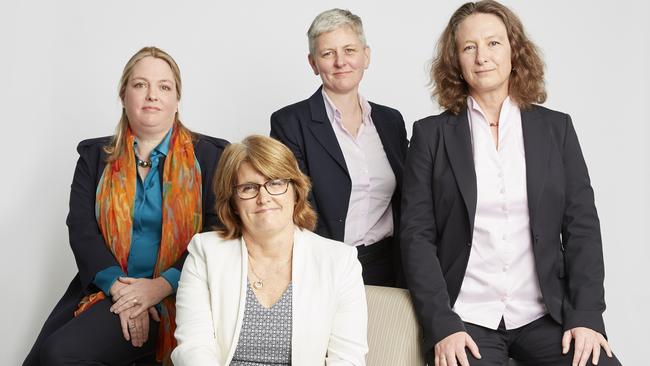RBA glass ceiling a fading memory
Luci Ellis, the second woman to be appointed an RBA assistant governor, plays a key role in economic policy.

Reserve Bank assistant governor Luci Ellis describes herself as “the silver medallist who kind of got there in the end”.
Ellis is the second woman to become an assistant governor of the Reserve Bank, appointed to the key role of assistant governor (economic) in December last year, and plays one of the key roles in the bank’s economic policy.
Her appointment followed Michele Bullock’s promotion to assistant governor (financial system) — another key policy role in the bank — in October last year, having quietly broken through the Reserve Bank glass ceiling in 2010 to become its first woman appointed as one of six RBA assistant governors.
In a frank interview in today’s Deal magazine, Ellis describes how, in her early career, she felt she was not on an upward career trajectory at the bank but was deterred from moving to the private sector because of her concerns that it would be too homophobic for an openly gay woman.
“In the 90s, I felt I would not fit into the private sector for fairly obvious subcultural reasons,” she says.
“I thought it would be fairly blokey and homophobic. In the 90s it was probably so.”
The two most senior women in the Reserve Bank, Ellis and Bullock, are both career central bankers playing key roles in policymaking, but both are very different people.
Bullock describes herself as a “country girl from Armidale”, studying economics at the University of New England, and joining the bank in 1985.
Ellis comes from Melbourne and studied Commerce at the University of Melbourne before joining the bank in 1991.
Wanting to improve her economic credentials, she did a Masters in Economics at ANU and PhD at the University of NSW while working at the bank.
Ellis is the chief economic adviser to the bank and helps formulate recommendations for the monthly board meetings about what should be done on interest rates.
She spent two years working at the Bank for International Settlements in Switzerland in 2007 and 2008 where she had a first-hand view of the impact of the global financial crisis.
Returning to Sydney as the bank’s head of financial stability, she worked with then assistant governor Philip Lowe in handling the work as a result of the federal government’s move to provide guarantees for banks and other players in the financial system.
“It was quite a defining moment for me about why we were here at the RBA,” she says.
“The experience underlined for me the incredible importance of being able to do good works.”
Ellis’s role in economic policy has garnered her much public attention since her appointment.
But with her new higher profile she has also felt an obligation to be a role model for younger women, including gay women.
Ellis says she took the decision to “come out” in an interview with a Wall Street Journal journalist because of the interest in her appointment and a realisation that her being more open might make life a little easier for other gay women. “I have always worked on the assumption that anyone with a functional gaydar should be able to work it out. I wasn’t going to hide it,’’ she said.
“But I felt it was my duty not only to be a good role model for young women and girls generally, but for young lesbians specifically.
“It is important to be able to be open about who you are.
“I came out as a teenager in the 80s at a time when homosexuality wasn’t even legal.”
But even in today’s more liberal environment, it is a process that still has its risks, especially for someone working with a conservative public institution like a central bank.
Ellis, who describes herself as a “navy wife”, confirmed through a bank spokeswoman yesterday that she was “obviously pleased and relieved that the (same-sex marriage) survey has returned a yes vote.”
Bullock’s career has been one of quiet achievement, steadily rising up the ranks of the bank.
She chose the Reserve Bank as she “wanted to work in the public service — to do something in the public interest,” she told The Deal.
She did a Masters at the London School of Economics before returning to Sydney as manager of the payments policy section of the bank that was set up after the Wallis inquiry recommended the Australia Prudential Regulation Authority take over supervision of the banking system.
Her work in payments saw her become involved in the bank’s court case against credit card companies that challenged the bank’s legitimacy in regulating credit card fees (the bank won).
In 2010, she was promoted to assistant governor (currency) and given the challenging role of chairing Note Printing Australia, the currency printing arm at a time when it was under scrutiny because of allegations over its sister company, Securency.
The role saw her involved in the early work on the development of the latest edition of Australia’s bank notes.
Her current role involves the RBA’s oversight of the payments system, including working with the banks on the implementation of a new real time payments system set to apply from next year.




To join the conversation, please log in. Don't have an account? Register
Join the conversation, you are commenting as Logout